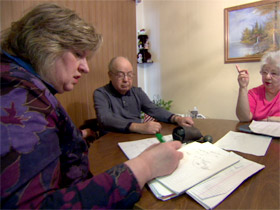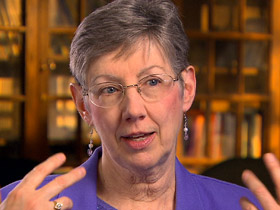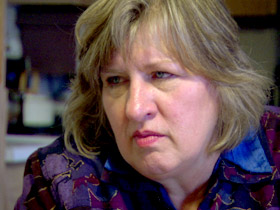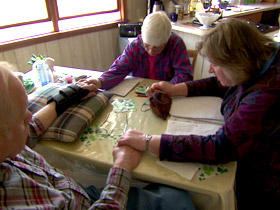In This Episode << SLIDE LEFT TO SEE ADDITIONAL SEGMENTS
Parish Nurses
DEBORAH POTTER, correspondent: Many churches hold health fairs, but this blood pressure screening at Queen of the Rosary Roman Catholic Church in suburban Chicago is a little different.
Diane Tieman (speaking to parishioner): You actually cook for yourself? That’s good.
POTTER: It’s a regular event organized and run by Diane Tieman, a registered nurse who’s on the church staff.
TIEMAN: I do health education classes. I do blood pressure screenings. I take calls from people that want information about the health care system, about themselves and their health concerns.
POTTER: And she does a lot more. Home visits are an essential part of Tieman’s job as a parish or faith community nurse, helping church members, many of whom are elderly, prepare for doctor visits and surgeries.
Tieman: Let’s just listen to your heart.
 POTTER: Parish nurses are health counselors and advocates. They do not provide treatment. But there’s more to the job than checking vital signs, reviewing medications, and helping people navigate the health care system.
POTTER: Parish nurses are health counselors and advocates. They do not provide treatment. But there’s more to the job than checking vital signs, reviewing medications, and helping people navigate the health care system.
TIEMAN: People just need to be heard and need to be listened to, and as a parish nurse that’s one of the greatest things that we do is be present and just listen.
BOB FORREST: Diane’s been a gem. If she doesn’t make it to heaven, nobody will. She’s been great.
POTTER: Parish nursing is one of the fastest growing specialty practices recognized by the American Nurses Association. Registered nurses with at least two years’ experience are certified after receiving additional training on how to care for the whole person—not just physically, but spiritually.
TIEMAN: It’s a matter of being an integrator of health and faith, and for us as parish nurses we really believe in that spiritual component, how important that is to an individual. And I know when I work with individuals many a-times if spiritually they’re not well, it’s very difficult for them to become physically well.
POTTER: Parish nurses also serve as lay ministers bringing prayers and sometimes communion to the people they visit.
Irene: I would have been lost without you. You kept me all in one piece, you know what I mean?
POTTER: Parish nursing traces its roots back to the 1800s, when religious orders in the U.S. and Europe offered care to the wider community. The modern program was launched 25 years ago by a Lutheran pastor here in Chicago, and it’s since spread around the world. Some 15,000 parish nurses are now at work in the United States alone.
 MAUREEN DANIELS (International Parish Nurse Resource Center): It started out Christian, but actually we have a lot of Jewish faith community nurses. We have some Muslim—our Crescent nurses, and we also have some that are working in Buddhist communities, Hindu, and others.
MAUREEN DANIELS (International Parish Nurse Resource Center): It started out Christian, but actually we have a lot of Jewish faith community nurses. We have some Muslim—our Crescent nurses, and we also have some that are working in Buddhist communities, Hindu, and others.
POTTER: Maureen Daniels, herself a former parish nurse, now trains nurses to work in faith communities, looking after the whole person.
DANIELS: We’re not just our heart or our liver or our kidneys, you know. We have—there’s the person that’s there, and part of being a person is that whole dimension of spirit that makes us who we are. And you can’t break it down into pieces the way we’ve been doing, you know. It really needs to be, you know, who is this whole person? What is their life about?
DONNA SMITH-PUPILLO: Come in Susan, have a seat.
POTTER: Donna Smith-Pupillo coordinates a network of parish nurses in and around St. Louis. Some work mostly with the poor and uninsured or with young families. But they all share the same sense of purpose.
DONNA SMITH-PUPILLO (Deaconess Parish Nurse Ministry Network): Parish nursing is about the intentional care of the spirit and bringing back in for all of us a sense of wholeness that embraces both the mind, the body, and the spirit and that it’s doable for almost all congregations, synagogues, and mosques. It is doable. It’s not something that has to be paid. You can use volunteers. You can find someone who’s interested and wants to serve.
 POTTER: Most parish nurses, in fact, are unpaid and work part-time. Some, like Diane Tieman, are paid partly by a church and partly by a hospital, where they also serve. On this day, Tieman has brought a hospitalized parishioner a handmade shawl.
POTTER: Most parish nurses, in fact, are unpaid and work part-time. Some, like Diane Tieman, are paid partly by a church and partly by a hospital, where they also serve. On this day, Tieman has brought a hospitalized parishioner a handmade shawl.
Tieman (speaking to patient): It is filled with prayers, and this one was actually made by Jerri.
Patient: Thank Jerri for me.
Tieman: I will.
POTTER: There are some things a parish nurse can’t do, like administer medications or give injections. But they can offer programs other nurses don’t, like the Queen of the Rosary knitting group that makes the shawls…
Knitting Group: Dear Lord, bless my hands…
POTTER: …and prays for those who will receive them. Tieman also works with other faith communities setting up events like this labyrinth walk at a nearby Methodist church.
TIEMAN: I really feel like when people walk the labyrinth it’s a mind, body, and spirit experience because it not only makes you relaxed and stress relieved, but for those who regard it as a spiritual tool it really helps you to build your relationship with God.
 POTTER: Tieman is not a member of the Catholic church where she works, although some parishes nurses are. Either way, experts say, the best predictor of success is the strong support of the pastor.
POTTER: Tieman is not a member of the Catholic church where she works, although some parishes nurses are. Either way, experts say, the best predictor of success is the strong support of the pastor.
FATHER ED PERINE: I can’t be there for all those people all the time, and so she fills in, and parishioners fill in doing that. And she also keeps me apprised when there’s a special need, or somebody requests to see me, or someone is dying—that I can go and see them. I don’t know what we would do without Diane.
POTTER: Many parish nurses see their work as more of a calling than a job.
TIEMAN: For me it is. Yeah, it is. I feel blessed and really humble, because for me in this job it really has increased my own faith as I work with people.
LINDA LANTZ: She knows where I’ve come from. We’ve been prayer partners a long time. Without it, I don’t think I would survive.
(Praying): Our Father, who art in heaven, hallowed be thy name…
POTTER: Parish nursing can be demanding and stressful, like any other kind of nursing, but it has its own rewards.
TIEMAN: When I’m with somebody and look at them face-to-face or meet them heart-to-heart, I feel like it’s like meeting God head on and looking in his eyes.
POTTER: In Elk Grove, Illinois, I’m Deborah Potter for Religion & Ethics NewsWeekly.

